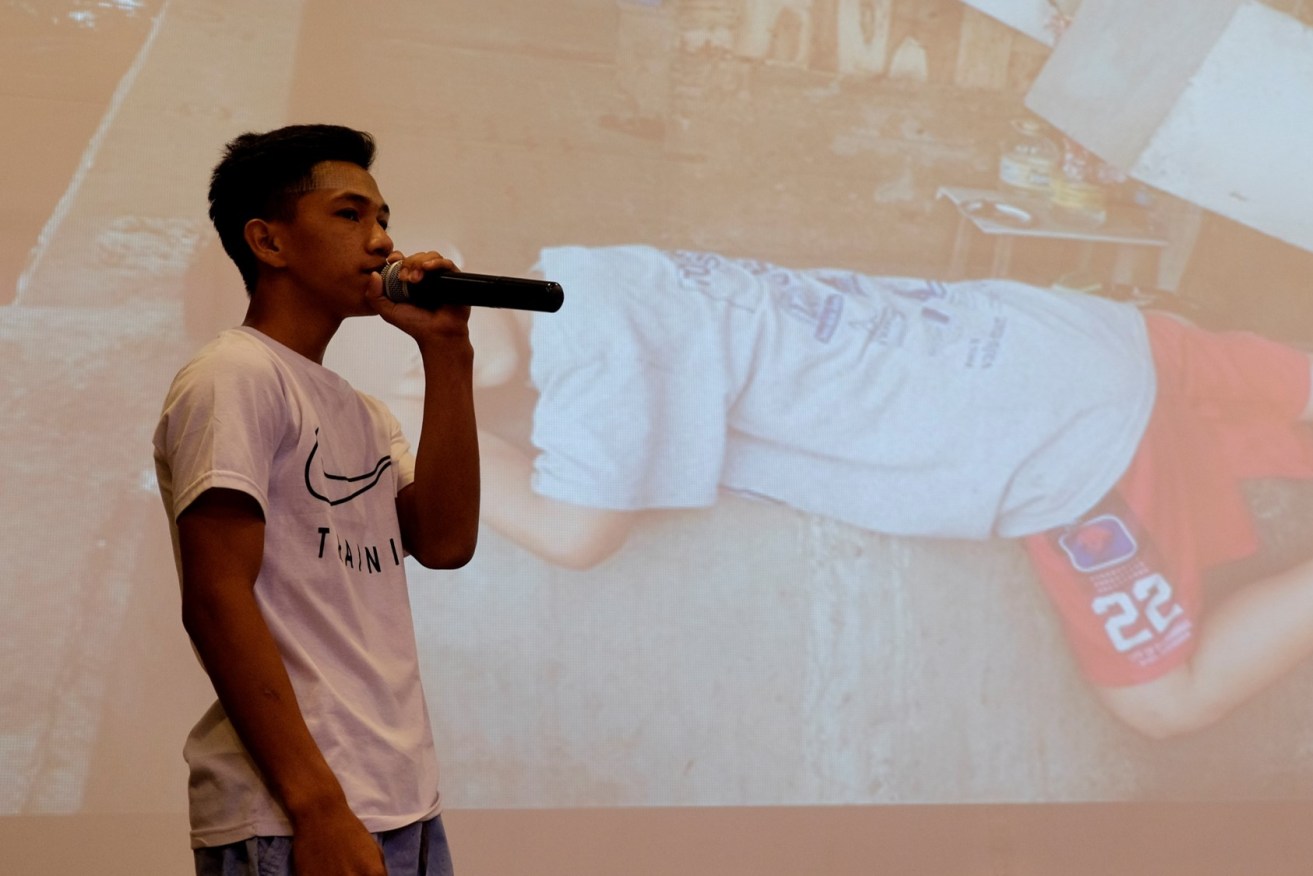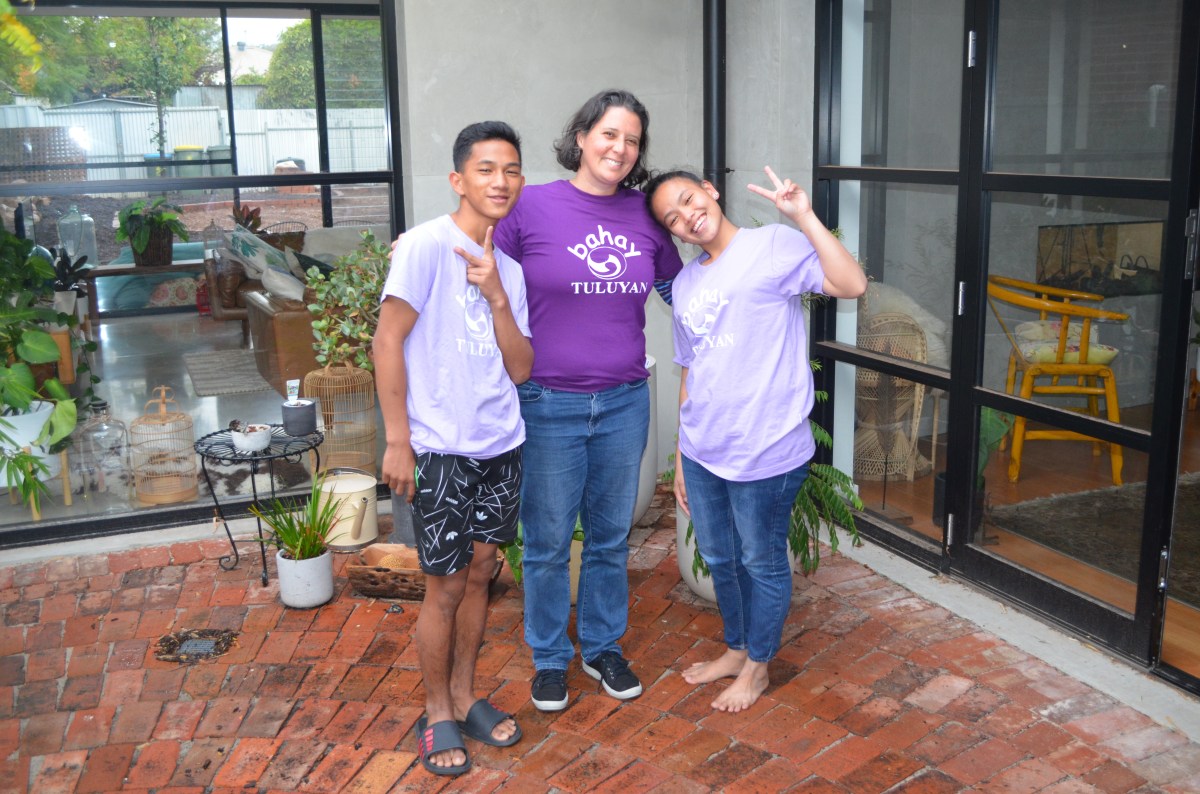Uplifting lessons in surviving life on Philippines streets
The harsh experiences of Filipino children growing up on the streets are being brought home to Adelaide school students in a bid to promote awareness and action about child poverty. Jessica Bassano talks to two survivors, and the Australian woman dedicated to change.

Justin Lacambia tells schoolchildren about surviving on the streets in the Philippines. Photo: supplied
Catherine Scerri was in high school when she took a trip to the Philippines which changed her life.
She met children who’d been abused, exploited and subjected to hours in detention centers.
The experience left her feeling confronted, overwhelmed – but inspired.
Scerri soon encountered a group, Bahay Tuluyan, set up in 1987 by a Filipino parish church group whose members were concerned by the growing number of street children in Manila.
It was here Scerri discovered a space filled with people optimistic in the face of adversity.
“I was blown away by the positivity, the energy and the way kids were doing something to make the world a better place, they weren’t just there to get help for themselves,” she said.
“The spirit and the young people of Bahay Tuluyan, getting together, teaching each other, going to the street and leading.
“That for me has been a very powerful draw card so I said I wanted to go back.”
Now 41, the lawyer and activist divides her time between Australia and the Philippines.
She has seen Bahay Tuluyan expand to four locations throughout the islands, offering spaces for young people to gain employment and learn skills such as farming.
She also joined the NGO’s staff and students as they cross the globe educating people about the injustices of Filipino children.
Scerri and two Filipino teens, Donita Ruiz and Justin Lacambra, are now in Australia, talking to students at schools in Adelaide and interstate about social justice in a bid to raise awareness about poverty and issues facing young people in the Philippines.
“Donita and Justin have a performance where they talk about their experience living on the street and the… push and pull factors that affected them,” Scerri said.
“What we do with the kids is try to help them understand a bit about how the world’s resources are distributed.
“We want to give them a chance to see things through someone else’s eyes.”
Ruiz is a vivacious 18-year old. She came to Bahay Tuluyan as a child.
“My mother works as a garbage collector. Not in the government or something, she just gets garbage and cleans it and then sells it to the junk shop,” Ruiz said.
“And so I was growing up on the street but I’ve always loved reading, that’s the thing that drove me to school because they have lots of books.
“I feel safe there and not on the street… [on] the street I always experienced those things that make me scared.
“But I’m learning to open myself up and speaking up for what happened and being an inspiration or something.
“I just wanted to share my experiences… and tell other people what’s really happening.”

Catherine Scerri with Justin Lacambra and Donita Ruiz. Photo: Jessica Bassano
Ruiz’s family represents the more than 20 per cent of Filipinos living in poverty. But she hopes to break that cycle when she completes year 12 next year.
Like Ruiz, Lacambra learnt to read and write through one of Bahay Tuluyan’s programs.
The organisation also helped shelter him from the street violence rife throughout the country.
“My mother was arrested because of drugs and my father was always drinking and hurt us. Not only me but also my other siblings and I decided to go onto the street,” the 19 year-old said.
“In the street I learnt a lot of things that I need to do just to survive. Like I need to collect garbage… and I [was] involved in one group, like a group of guns and they teach me how to steal, how to fight and sometimes we are involved in riot.
“The last time with my cousin, when we was stealing, the police… chased and my cousin was caught.
He was dead. And then I realised and I think it’s time to change my life.”
Bahay Tuluyan runs a number of programs engaging people across four areas: children, young people, families and communities.
Scerri says she has seen how the group can influence policy. But progress is slow, and not aided by the current government.
“It’s pretty grim and to some extent we’re going backwards,” Scerri said.
“If you’d asked me three years ago I would have been a bit more positive.
“I need to stay pretty low key, especially as a foreigner, especially as a female. It’s not a good environment and a human rights activist, female and foreign are three tick boxes that you don’t want to be ticking at the moment.
“But as an organisation we’re still strongly speaking out.
“We’re doing a lot of documentation of people experiencing human rights violations… and we’re working with groups making sure that the documentation gets to the people who need it, who can do something with it.
“At the moment the government is pushing to lower the age of criminal responsibility from 15 [years]. They want it to go to nine, they might negotiate it to 12, but we’re strongly advocating against that.
“We just don’t think that’s at all going to be helpful.”
The last time with my cousin, when we was stealing, the police… chased and my cousin was caught. He was dead. And then I realised and I think it’s time to change my life.
The proposed law is part of President Rodrigo Duterte’s anti-drug campaign, which, according to the Philippine drug enforcement agency has claimed more than 5,000 lives.
Duterte has repeatedly critisised the current law, claiming drug dealers are using children as drug mules and getting away “scot-free”.
When he assumed office in 2016, Duterte ordered the police to kill anyone they believed to be connected to the drug trade.
Part of Scerri’s job has been educating police on the rights of children.
“We’re seeing very high rates of killings but also police torture and violence against kids on the street,” she said.
“Our work with the police is often very difficult… what happens a lot in the street in Manila is the government just goes out and [does]… what they call rescuing children, but it’s just rounding them up.
“They lock them up in what they call shelters but they’re really detention centres. They’re pretty horrendous.
“[We’ve] documented the practice of rescue and highlighted that it’s actually more like arrest than rescue and it needs to improved.
“And that actually led to the laws being changed. But in this circumstance, even though the laws have been changed, [the police] were still doing the same thing.”
Scerri, Ruiz and Lacambra are hopeful their work in Australia might inspire people to take action and speak out against injustices.
“[Having] spent a lot of time in the Philippines with kids in very difficult circumstances you can choose to see those circumstances as isolated, localised problems or you can choose to see them as the affects of bigger global structures and structural injustices,” she said.
“And I really do believe we have a responsibility here in Australia to know more about how our actions or inactions affect other people in the world.
“Especially at the moment in the Philippines it’s very, very difficult for kids to speak up, particularly those who are marginalised.
“I think it’s really important that every little action that we take has a ripple on affect. And it might not feel direct but all of those actions combine.
“There’s nothing that says someone from Australia is different from someone from the Philippines.
“I think as human beings we live in this very tiny microcosm and we sometimes forget that there’s a whole world out there.
“This is bigger than us and… there needs to be a global effort if we want to see global change.”
Want to comment?
Send us an email, making it clear which story you’re commenting on and including your full name (required for publication) and phone number (only for verification purposes). Please put “Reader views” in the subject.
We’ll publish the best comments in a regular “Reader Views” post. Your comments can be brief, or we can accept up to 350 words, or thereabouts.
InDaily has changed the way we receive comments. Go here for an explanation.




